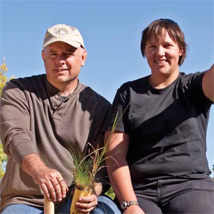 When Paula Collins arrived at Lethbridge College from Winnipeg in 2008 to begin Lethbridge College’s four-year Conservation Enforcement program, she brought along a belief in environmental sustainability. Before her first Christmas on campus, she had created what has become the Eco- c collective, a group of students who share a determination to make a difference through action.
When Paula Collins arrived at Lethbridge College from Winnipeg in 2008 to begin Lethbridge College’s four-year Conservation Enforcement program, she brought along a belief in environmental sustainability. Before her first Christmas on campus, she had created what has become the Eco- c collective, a group of students who share a determination to make a difference through action.
The seeds it sowed fell on fertile ground. In its first few months, the Eco-Collective helped secure $12,000 in grants to grow two visible and constructive projects, both of which include a benefit to the college, its students and the community.
The most visible is the Cousins Outdoor Living Theatre, a xeriscaping demonstration garden of drought-tolerant native plants located at the east end of the Cousins Science Centre. The club obtained a $7,000 grant from Wal-Mart to develop the garden, built in an amphitheatre design to allow for student and community education classes and demonstrations.
The all-inclusive club (no membership fees, open to all students) is much like the garden it has helped create: small but hardy. Club members hail from diverse programs, from Nursing to Communication Arts, something the club, originally started by three students in the School of Environmental Sciences, encourages. Because they are not necessarily schooled in native plants, they sought the assistance of instructor Steve MacRae. A mild-mannered teacher during the work week, MacRae has become a fierce proponent of xeriscaping in southern Alberta, and provided the knowledge students required to select and secure the garden greenery.
“Steve was a huge help to us,” says Collins. “His expertise and enthusiasm was invaluable to getting the garden in the ground.”
That happened on the last warm Friday of October, when some 30 students and instructors turned out to cultivate and plant under MacRae’s guidance. Interestingly, because all plants selected are native to southern Alberta, they do best in natural growing conditions; when a limber pine was ready to plant, the college’s soil had to be amended with coarse gravel to better reflect those conditions.
MacRae says xeriscaping is a slow-growth concept in the suburbs of Lethbridge, where manicured lawns and imported shrubs still hold sway in most yards. But he continues to educate and encourage others to consider the concept when they develop their properties.
Through his own small endeavour, Prairie Xeriscape Designs, MacRae tours groups through his own property to spread the word. Last summer, he showed upwards of 80 people, from the Oldman
River and Milk River watershed councils, what can be accomplished. He’s determined to dispel the myth xeriscaping means a yard full of gravel, a rock and two junipers.
“That would be ‘zeroscaping,’ not xeriscaping,” he says. “Zeroscaping is worse than lawn because it creates heat and encourages weeds.”
Xeriscaping comes from the Greek xeros and the Latin xeric, meaning dry. While he encourages supplemental watering in the first two years, MacRae notes a xeriscaped garden will thrive without assistance from the tap once plants are established.
And it’s all about the plants: the more the merrier.
“The idea is to dominate the land with plants,” says MacRae. “You use some rocks and gravel as accents, and mulch to help retain moisture, but the plants will eventually take over and propagate on their own if you have patience.”
The savings in water alone make a convincing argument for switching to xeriscaping. MacRae conservatively suggests the average reduction for a basic residential lot would be about 70 per cent, based on annual Lethbridge precipitation – enough for native plants – and the suggested weekly 2.5- centimetre watering supplement for sod.
The benefits extend beyond water consumption. While weeds love open gravel, they find it difficult to compete with established plants in a properly xeriscaped garden. And native plants, admittedly harder to find and more expensive than horticultural varieties (go figure), will survive treacherous winters and summer drought, thus reducing replacement costs. They require no herbicides, pesticides and fertilizer, again reducing cost and impact on the aquifer.
Xeriscaping allows for personal flourishes: no two efforts need look the same, thanks to plant selection and layout. They can also sport a dainty, manicured, defined look with plants easy to control. “You don’t have to end up with a wild coulee look,” says MacRae.
The Eco-Collective won’t spend much time enjoying its first success, says Collins; there’s more work to be done. It has used a $5,000 grant to bring recycling to college residences, giving more than 400 students an option greater than BFI bins in the parking lots. Each residence was supplied with two blue boxes, which are picked up regularly by members of the Kodiaks cross-country team and emptied at the nearest recycling depot.
“Your interest level in recycling and the environment seems dependent on how you were brought up,” says Collins. “We held an info session when we first started, and found many students didn’t know they could recycle items as simple as cans. We’re trying to raise awareness and get people into the habit.
“We’re taking small steps now, but with more support we can do much more.”


